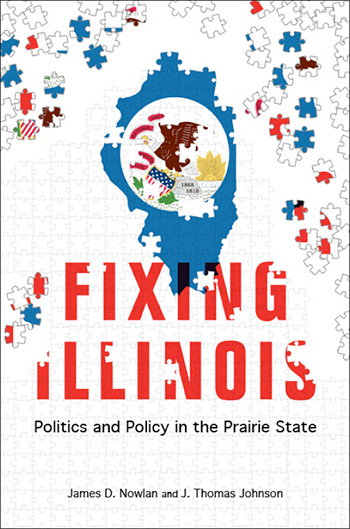| « Where is Chicago's Progressive Mayor? | Bernie Sanders: 2016's Most Interesting Man » |
Illinois Wed Jun 04 2014
Fixing Illinois Offers Few Feasible Immediate Solutions
 To say Illinois is in a broken state and needs fixing is to state the obvious. The state has a $47.2 billion debt and is often the butt of jokes when it comes to corruption. In James D. Nowlan and J. Thomas Johnson's new book Fixing Illinois: Politics and Policy in the Prairie State, there are 98 suggestions given as to how to solve and lessen the problems in Illinois, but many of them don't feel feasible in the current political climate for the state.
To say Illinois is in a broken state and needs fixing is to state the obvious. The state has a $47.2 billion debt and is often the butt of jokes when it comes to corruption. In James D. Nowlan and J. Thomas Johnson's new book Fixing Illinois: Politics and Policy in the Prairie State, there are 98 suggestions given as to how to solve and lessen the problems in Illinois, but many of them don't feel feasible in the current political climate for the state.
The book covers a variety of topics in Illinois policy including education, budgeting, economic development, transportation, health care and human services. Outside of the section on transportation, many of these ideas ring as absurd for implementation in Illinois. Some of these may be more feasible in states other than Illinois, but could never work in this particular state.
An example of this is the suggestion of expanding school choice options through charter schools, vouchers and open enrollment. Charter schools are already a contentious issue in Illinois due to hiring practices and selection of students, as well as numerous issues that have recently come to light with the United Neighborhood Organization, which was recently charged by the Securities and Exchange Commission for defrauding investors. Vouchers have been controversial in neighboring Wisconsin largely because it puts public schools in direct competition with private schools through taxpayer funding for private schools and giving parents a choice if their children attend a public school that is not performing well.
Other ideas won't work well simply because of the status quo and the bad reputation of various practices in the state of Illinois. Nowlan and Johnson suggest outsourcing facilities maintenance, which could be rejected by the public since privatization has gone wrong in many instances in Chicago. They also recommend prohibiting senior staff and supervisors from joining unions, which seems like a bad idea since having unionized senior staff could allow for a more positive work environment since all workers are unionized. The authors further suggest ensuring for good water conservation in the section on economic development, but little context is provided for readers to understand why this would improve Illinois' lagging economic development.
The least plausible suggestions appear in the section addressing human services and health care. Although the authors recommend adopting AFSCME Council 31's Preventative Health Care model to reduce costs for Medicaid, other ideas for health care are simply not feasible. Nowlan and Johnson suggest practices to reduce reliance on emergency rooms for primary care, such as when people go to the ER for a cold or flu. Among the proposals provided by the authors is requiring a co-pay for patients who "inappropriately use emergency care." This is ultimately illegal because federal law prohibits turning away patients based on their ability to pay. Additionally, what is considered an inappropriate visit to the ER is very subjective. Some might think going to the ER for a broken arm at 9 p.m. is an inappropriate visit and you should wait to see your doctor the next day. Others might think there is ultimately nothing wrong with going to the ER for a bad cough or a cold because some areas are lacking in primary care, which is true in Chicago. If something like this were to be implemented in Illinois, it would just lead to several cases of patient dumping since people will inevitably have differing opinions on what you should go to the ER for.
Nowlan and Johnson also advise hospitals to create "Prompt Care" clinics at ERs for large hospitals to screen patients and refer them to the "Prompt Care" clinics. However, even at large hospitals this would be difficult to implement, since such a clinic would require additional nursing staff, and there's already a nursing shortage in this country. And while the authors only address large hospitals, smaller hospitals may still be saddled with having to spend money on patients who come to the ER for cases best treated by a primary care doctor.
Fixing Illinois does offer some excellent suggestions in the transportation section, which is easily the best section of the book. The authors recommend creating a freight division in the Illinois Department of Transportation. This would be a good idea since it seems Illinois' freight transportation is likely to expand, both with rail and trucking, and a dedicated task force on freight could develop ways to reduce congestion. Other suggestions include developing a multi-year capital funding program for transportation and having the value of Motor Vehicle Registration fees vary depending on the size of a car, so a larger car would have a higher registration fee. Both seem very good for ensuring a better future for Illinois.
Had Fixing Illinois featured more practical suggestions that seem ready for implementation now in Illinois, it would be a fantastic book on policy in the state. Unfortunately many of the recommendations don't seem likely to occur in a state where our governor is immensely unpopular, our house speaker has been in power for 29 years and citizens seem content to elect corrupt politicians. When the status quo in Illinois changes, the ideas presented in this book will be worth revisiting, but by then it could be too late to fix the state.











